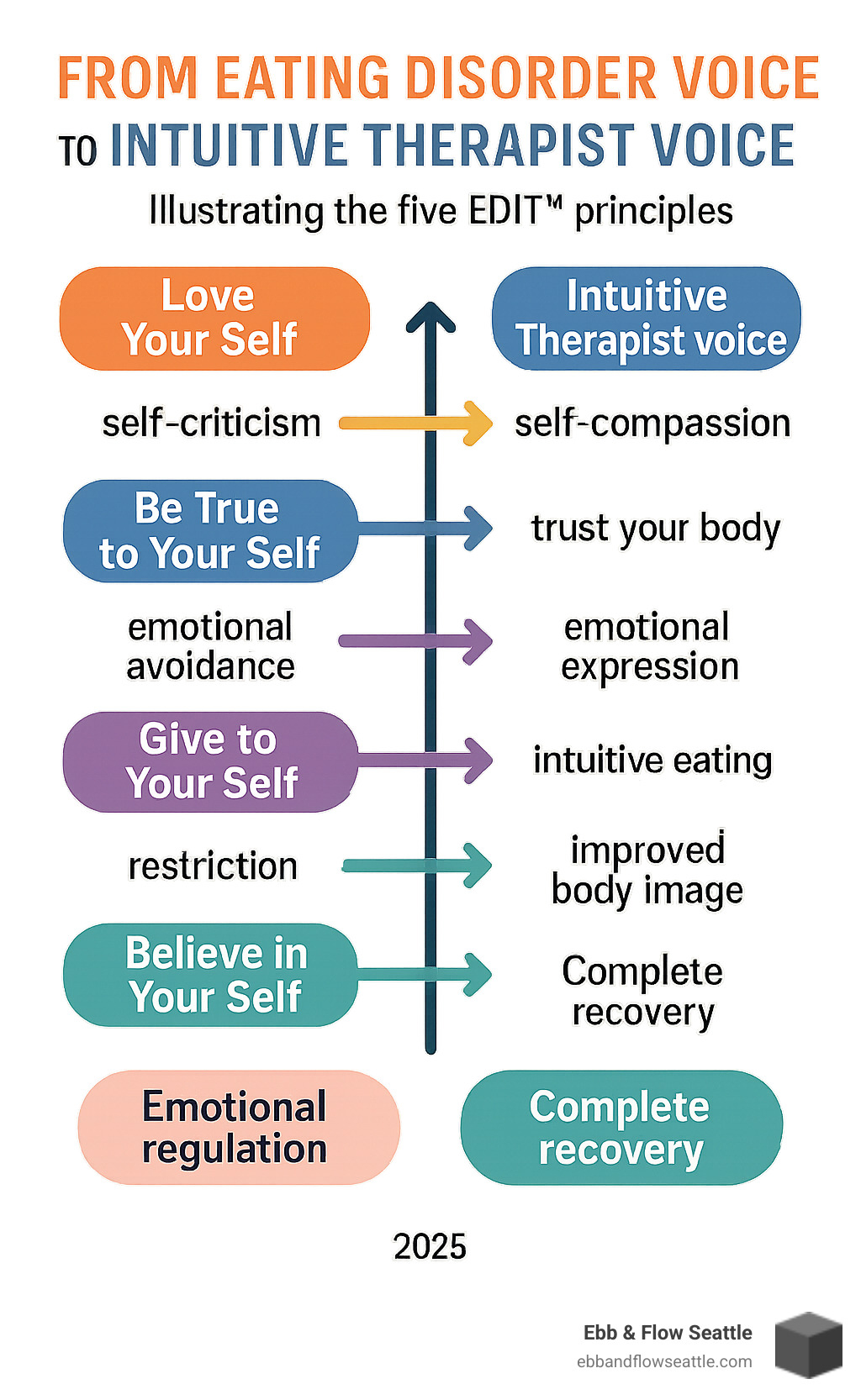From Chaos to Peace: How Eating Disorder Intuitive Therapy Transforms Healing

If you're reading this, chances are you've been caught in the exhausting cycle of disordered patterns - whether that's restricting, bingeing, or somewhere in between. Maybe you've tried traditional approaches that felt too rigid or clinical. Maybe you're tired of meal plans that don't account for your emotional reality, or treatment that focuses on symptoms without addressing the deeper wounds underneath.
At Ebb and Flow Nutrition and Mental Health Counseling, I understand, because I've walked alongside countless women who've found themselves in exactly this place. As a therapist specializing in eating disorder intuitive therapy in Lynnwood, WA, I've witnessed the profound transformation that happens when we shift from managing symptoms to embracing complete healing through Eating Disorder Intuitive Therapy (EDIT™).
What Makes Eating Disorder Intuitive Therapy Different?
Disorder intuitive therapy EDIT isn't just another treatment approach - it's a revolutionary way of understanding healing that honors your inner wisdom rather than imposing external rules. This method, specifically EDIT™, was developed in 1995 by Dr. Dorie McCubbrey, who created this treatment approach developed from her own journey through anorexia, bulimia, and binge eating disorder.
What sets this approach apart is its recognition that eating disorders create what we call a "false self" - that critical, controlling voice that drowns out your authentic wisdom. Healing isn't about managing symptoms forever; it's about peeling away this false identity to rediscover your true self when the eating disorder voice isn't calling the shots.
In my practice, I've seen how this approach resonates particularly well with sensitive women who've learned to be the "good girl" - those who've been over-functioning since childhood and have found themselves trapped in patterns of perfectionism, people-pleasing, and disconnection from their authentic selves.

Understanding the Two Voices Within
One of the most powerful aspects of eating disorder intuitive therapy is learning to distinguish between two completely different voices in your head. There's the Eating Disorder Voice - that critical, fear-based inner critic driving disordered behaviors. Then there's your Intuitive Therapist Voice - your inner wisdom that's compassionate, curious, and deeply connected to your body's natural signals.
I call the moments when you catch the eating disorder voice and consciously choose your Intuitive Therapist instead "ED-ITs." These aren't about forcing positive thoughts or toxic positivity. They're about developing genuine self-compassion and learning to trust your body's innate wisdom again.
Your Intuitive Therapist is like having a wise, compassionate counselor inside you 24/7. It incorporates your physical hunger and fullness cues, emotional needs, energy levels, authentic values, and spiritual purpose. This inner guidance often feels like a sixth sense or gut feeling that can guide your healing decisions in everyday life.
This builds on what we call interoceptive awareness - your ability to sense what's happening inside your body. Eating disorders damage this awareness, but I've witnessed countless clients restore it through practice, patience, and the right therapeutic support. Dr. Dorie McCubbrey's evidence based practices ground this work in scientific research while honoring the spiritual dimensions of healing.
The Five Sacred Principles of Healing
The heart of eating disorder intuitive therapy EDIT lies in five core principles that guide your healing process. These aren't rigid rules but gentle guideposts helping you reconnect with your true self. In my practice, I weave these principles through our work together, adapting them to your unique story and healing process through this treatment approach developed specifically for deep transformation.
Principle 1: Love Your Self
Self-love in this context means developing genuine self-compassion and recognizing your unconditional worth regardless of appearance or food choices. This includes challenging the perfectionist standards that keep you trapped in shame cycles.
For many of my clients who learned to be the "good girl," this principle is revolutionary. We explore what it means to extend the same kindness to yourself that you naturally give to others. This might involve mirror work, self-compassion exercises when you make mistakes, or simply learning to speak to yourself with the same tenderness you'd offer a dear friend.
Principle 2: Be True to Your Self
This principle focuses on honoring your body's natural hunger and fullness cues and authentic preferences. We work together to identify subtle hunger and fullness signals, choose foods based on what sounds appealing to your body, and move in ways that feel nourishing rather than punitive.
This principle often challenges women who've spent years ignoring their body's signals in favor of external rules. I guide you through the process of rebuilding this trust, understanding that your body has been waiting patiently for you to listen again.
Principle 3: Express Your Self
Many women with disorders struggle to identify and express emotions, using food behaviors as coping mechanisms instead. This principle develops emotional literacy and builds healthy coping skills through disorder intuitive therapy EDIT techniques.
In our work together, we explore creative expression, assertive communication, and emotional regulation strategies. I believe deeply in the power of authentic expression - whether that's through journaling, art, movement, or simply finding your voice in relationships. We address addictive behaviors and patterns that may have developed as ways to cope with overwhelming emotions.
Principle 4: Give to Your Self
Self-care encompasses holistic nourishment - spiritual, emotional, mental, and physical. This includes gentle nutrition, adequate rest, meaningful relationships, joyful activities, and spiritual practices that resonate with your soul.
My approach honors the spiritual dimension of healing. I've found that many sensitive women have a natural connection to something greater than themselves, and nurturing this connection becomes an essential part of their own journey toward wholeness.
Principle 5: Believe in Your Self
This principle builds unshakeable self-trust and confidence in your ability to navigate life without eating disorder behaviors. We work on daily practices that connect you with your future healed self and develop personalized strategies for maintaining your transformation.

Why This Treatment Works
In my practice, I take an approach that sets this method apart from many traditional treatments. Rather than using external markers as progress indicators, we focus on internal experiences like body appreciation, emotional regulation, and authentic self-expression through disorder intuitive therapy EDIT principles.
This approach recognizes that true healing happens from the inside out. When we focus solely on external markers, we miss the deeper healing that needs to occur. Your relationship with your body, your emotions, and your true self - these are the real indicators of transformation.
Research consistently shows that fully healed individuals endorse significantly higher levels of body trust compared to those who are partially healed or still struggling. Over 100 studies support these principles' connection to better mental health, including reduced anxiety and depression. The evidence based practices integrated into this work demonstrate remarkable outcomes for lasting change.
Who Benefits from This Approach?
Eating disorder intuitive therapy works beautifully for women experiencing anorexia nervosa, bulimia nervosa, binge eating disorder, chronic dieting, food obsession, emotional patterns, and exercise addiction. But it also serves those who might not have a formal diagnosis yet find themselves constantly worried about food or body image.
In my experience, this approach particularly resonates with sensitive women who:
- Have learned to prioritize everyone else's needs above their own
- Use busyness or perfectionism to avoid difficult emotions
- Have a history of toxic relationships or people-pleasing patterns
- Feel disconnected from their authentic desires and needs
- Are tired of rigid approaches that don't honor their emotional reality
- Sense there's something deeper driving their food struggles
Many of my clients come to me saying, "I don't want THIS... but I don't know what the THIS is that I do want." They've spent so long adapting to others' expectations that they've lost touch with their own inner compass. Through their own journey of healing, they rediscover who they really are beneath the protective patterns they've developed.
The Science Behind This Approach
The research supporting these principles in eating disorder treatment is extensive and compelling. Physical health improvements include stabilization, improved cholesterol and blood pressure regulation, and reduced inflammation markers.
The psychological benefits are equally striking: increased self-esteem and life satisfaction, decreased anxiety and depression, and reduced emotional behaviors as people learn to address feelings directly rather than through food. Dr. Dorie McCubbrey's original research continues to influence how we understand the connection between intuition and healing.
What I find most encouraging is that fully healed individuals show body appreciation levels virtually identical to people who never had disorders. This suggests that complete transformation - not just symptom management - is absolutely possible through disorder intuitive therapy EDIT methods.
Body appreciation emerges as a reliable marker of full healing, meaning you learn to respect and care for your body regardless of appearance. You develop the ability to appreciate what your body can do rather than focusing solely on how it looks, and you learn to respond to body image challenges with kindness rather than harsh criticism.
What Healing Looks Like in Practice
Transformation through eating disorder intuitive therapy isn't a linear path, and I honor that reality in my work with clients. Your healing process is as unique as you are, and I tailor my approach to meet you exactly where you are through this treatment method.
We might begin with stabilization work, learning to distinguish between your eating disorder voice and your Intuitive Therapist voice. This foundation becomes the cornerstone for everything that follows in disorder intuitive therapy EDIT work.
As we progress, we focus on rebuilding your connection with your body's wisdom. This involves practicing recognition of hunger and fullness signals, developing emotional regulation abilities, and engaging in body image work with deep self-compassion. We develop practical coping skills that serve you in everyday life situations.
The empowerment phase brings your abilities into real-world situations through challenging but supportive exposures. We work on developing your personalized strategies for maintaining transformation and strengthening your authentic self-expression through your own journey of discovery.
Addressing Medical Considerations
It's important to acknowledge that medical stability comes first in any eating disorder treatment. If you're dealing with severe malnutrition, dangerous changes, or medical complications, your body needs immediate medical support before we can effectively work with hunger and fullness cues.
I work collaboratively with medical doctors and registered dietitians when needed to ensure you receive comprehensive care. Sometimes meal plans might be necessary initially if there's complete loss of hunger/fullness cues or immediate safety concerns.
This approach works best when your body and mind are ready to trust internal cues again, which is why medical clearance and ongoing medical monitoring are important components of comprehensive treatment.
The Spiritual Dimension of Healing
What makes my approach unique is the integration of the spiritual dimension of healing. I've found that many sensitive women have a natural connection to something greater than themselves - whether you call it God, the Universe, nature, or simply your inner wisdom.
This spiritual component isn't about any particular religion but rather about recognizing that healing happens on multiple levels. When we honor the sacred nature of your healing process, we create space for transformation that goes beyond symptom relief through disorder intuitive therapy EDIT principles.
I bring my own spiritual perspective to this work, understanding that true healing involves reconnecting with your true self and your deeper purpose. This might involve exploring what gives your life meaning beyond food and body concerns, connecting with nature, practicing gratitude, or simply learning to trust the wisdom that exists within you.

Beyond Symptoms: Healing the Whole Person
Traditional approaches often focus on symptom reduction, but eating disorder intuitive therapy aims for something much deeper: complete transformation and authentic self-expression. This means healing the spiritual, emotional, mental, and physical aspects of your being together through evidence based practices.
Many disorders develop as coping mechanisms for deeper emotional wounds - trauma, attachment injuries, or simply growing up in a world that taught you to distrust your own needs and desires. Rather than addressing surface symptoms, this treatment approach developed by Dr. Dorie McCubbrey helps heal the core issues that fuel the eating disorder.
I've witnessed remarkable transformations when we address these deeper layers through disorder intuitive therapy EDIT methods. Clients don't just stop engaging in eating disorder behaviors - they discover parts of themselves they'd forgotten existed. They develop genuine self-trust, healthy boundaries, and the ability to navigate life's challenges without needing to control food or their body.
Navigating Common Challenges
Healing isn't always smooth, and I want you to know that's completely normal. You might experience moments of doubt, fear, or the urge to return to familiar patterns. Part of my role is helping you navigate these challenges with compassion and practical tools through your own journey.
One common challenge is learning to sit with difficult emotions without using food behaviors for relief. We work together on developing robust coping skills for emotional regulation, including mindfulness practices, creative expression, and somatic techniques that help you stay present with your experience in everyday life.
Another challenge is dealing with social situations involving food, which can trigger anxiety or eating disorder thoughts. We practice strategies for navigating these situations while honoring your healing needs and maintaining your authentic self-expression through disorder intuitive therapy EDIT techniques.
Building Your Support System
While our therapeutic relationship provides crucial support, building a broader support system is essential for lasting transformation. This might include trusted friends and family members who understand your process, support groups, spiritual communities, or creative outlets that nourish your soul.
I help you identify the types of support that resonate with your personality and needs. Some clients benefit from group settings where they can connect with others on similar paths, while others prefer more intimate support circles or individual creative practices that honor their own journey.
The Path from Chaos to Peace
Transformation looks different for everyone, but it always involves coming home to yourself. Maybe it's the first time you eat a meal without calculating calories. Perhaps it's looking in the mirror with kindness instead of criticism. Or it could be that moment when you realize you haven't thought about food or your body for hours because you were too busy living your life.
What I've learned through years of walking alongside women in healing is that peace is possible. Not the fragile peace of rigid control, but the deep, lasting peace that comes from trusting yourself completely through disorder intuitive therapy EDIT principles.
Your body has been waiting patiently for you to trust it again. Your true self has been there all along, even when the eating disorder voice seemed louder. Healing isn't about perfection - it's about connection, compassion, and the courage to keep choosing yourself, one moment at a time.

Taking the Next Step
If this approach resonates with you, I invite you to consider what healing might look like in your own life. What would it feel like to trust your body's wisdom? How might your life change if you could access your true self beneath the eating disorder?
The path from disordered patterns to intuitive living is sacred work. It requires patience, support, and the willingness to believe that you deserve more than just surviving - you deserve to thrive through your own journey of transformation.
In my practice in Lynnwood, I offer both online and in-person sessions, meeting you where you're most comfortable. I accept Regence insurance through August 2026, and I encourage you to reach out to discuss scheduling and any questions about how we might work together using eating disorder intuitive therapy methods.
Your story matters, your healing matters, and you deserve to live with the freedom and joy that comes from trusting yourself completely. Transformation is possible through disorder intuitive therapy EDIT, and you don't have to walk this path alone.
If you're ready to begin or continue your healing process, I invite you to contact me for a consultation. Together, we can explore how eating disorder intuitive therapy might support your unique path to healing and authentic self-expression.

